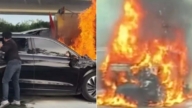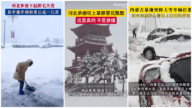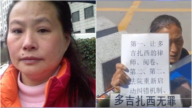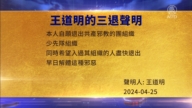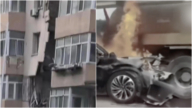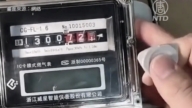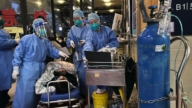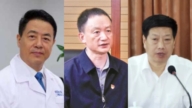【新唐人2011年7月26日讯】25号,造成两百多人死伤的“温州动车追尾事故”过去还不到38小时,在原因还没有查清的情况下,铁道部将破损车体碾碎,掩埋,引发民众和媒体的质疑。同时,出事路段已经恢复通车。
25号早上10点半,从温州南站出发,开往上海的列车驶过了“温州动车追尾事故”现场。事故发生还不满38小时,在很多问题都还疑点重重的情况下,出事路段已经恢复通车。
目前中共当局表示,事故原因是由于雷击导致设备故障。中共媒体一开始还将D301次列车司机潘一恒树立为英雄,不过民间则怀疑“调度不当”,和“司机疲劳驾驶”。
网友提出关于动车追尾的十大疑问,请铁道部回答;也有人对提铁道部“掩埋破损车体”提出五大质疑;更有媒体批评当局隐瞒真相,指出“和谐号事故”的七大疑团。
各个网站上网友提出的“十问”不尽相同,大致包括:
1、事故到底发生在何时?
2、雷击到底破坏了什么设备?如何防止雷击?
3、追尾时“自动闭塞系统”在哪?
4、D301为何会行驶在D3115后面,是不是调度问题?
5、为何事故没处理完就赶通车?
6、为何对事故车厢“挖坑填埋”,而不是拖走?
7、死伤人数究竟有多少?
8、铁路部门领导的任职为何如此快?
9、动车运营的“磨合期”究竟要多长?
10、如何赔偿?等等。
香港工程师学会前会长梁广灏:“正常情况无论什么天气,有任何机械的损毁,电脑的损毁,应该在后面的车是有足够时间停车的。最大的问题是,列车应该有自动保护系统,前面的车停了,后面的车与之相近,就会自动刹车的。为何原因它没刹车,这个我也不好去推论。”
其次、当局现场应急处理也疑点重重。
24号凌晨2点多,搜救工作结束,之后在现场坠落的几节动车车厢旁挖了几个直径10米左右的大坑,挖土机直接对车厢进行破坏拆卸,并将车厢的一些碎片进行碾压,然后推入坑中掩埋。
中共铁道部解释说,是为了“腾出空间,便于抢险”,但中国民众质疑,铁道部是在“毁尸灭迹” 。
《美国中文网》报导说,7月24号下午,中共当局曾经宣布车厢内已经没有生命迹象,要对车体进行拆解。但就在这条消息宣布不久,又有一名小孩从车厢中被搜救出来。铁道部发言人王勇平却说:“这只能说是生命的奇迹。”
不过,中共当局处理事故的态度被网友批为“野蛮”。民众质疑:为什么不保护现场和损毁的车辆,进行鉴定研究?车厢中还留有遗物,甚至可能有遇难者在弥留之际用数码设备录制了遗言。
“温州动车追尾事故”也引发了海外媒体的质疑。
日本《每日新闻》25号的文章说,中国的高铁一方面引进“外国的技术”,改良后在国内制造列车,另一方面“控制系统”使用的是“中国产”,这样“构造上”的问题,必然导致中共领导层的威信低下,毕竟中共是以“高铁”作为经济发展的象征。
香港工程师学会前会长梁广灏:“前面有障碍物,是会有足够时间停的,这是一个标准的安全措施,是全世界都通用的。我也相信这些列车有这些配备。有了这些配备,为什么还无法操作,我也很疑惑,我觉得当局要彻查。”
但是中共政权“管不住列车,管得住报导”。24号,当局举行记者发布会,却只允许喉舌媒体《新华社》、《中央电视台》及《人民日报》的记者进入,引起了在场记者的公愤。
另有中国媒体人士透露,各媒体已经接到中宣部通知,要求对“温州动车追尾事故”,要及时报导铁道部发布的消息,各地媒体不派记者去采访,特别是要管好子报、子刊和网站,不要链接高铁发展相关信息,不做反思性报导等。
新唐人记者林秀宜、尚燕、王明宇采访报导。
Questions about Train Crash
On July 23, two high-speed trains rear-ended in Wenzhou.
It has caused more than 200 casualties by July 25.
However, before the cause is determined by an investigation,
China’s Ministry of Railways crushed and buried
the broken train carriages within 38 hours after the accident.
This raised the media’s and people’s doubts.
Meanwhile, the railway was reopened.
At 10:30 a.m. on July 25, within 38 hours after the train crash,
the railway was reopened,
despite many unanswered questions regarding the accident.
Chinese Communist Party (CCP) authorities explained that
the accident was due to lightning-induced equipment failure.
At first, the CCP’s mouthpiece media even praised
Pan Yiheng, the driver of the crashed train D301, as a hero.
The people, however, suspected “improper scheduling"
and “drowsy driving" to have caused the crash.
Some netizens raised ten questions about the accident and
demanded responses from the Ministry of Railways.
Others questioned the immediate burial of the wreckage.
Still others criticized the authorities for covering up the truth.
Netizens’ “Ten Questions” are:
1. When did the accident happen?
2. What equipment was destroyed by lightning?
How to prevent this in the future?
3. How did the “automatic block system" on
the second train function when it rear-ended the first train?
4. Why was D301 running behind D3115,
not according to their schedules?
5. Why was the railway reopened
before the accident investigation finishes?
6. Why were the wrecked train carriages buried
instead of being towed away for further investigation?
7. What is the exact number of casualties?
8. How come the officials of Railway Ministry were
appointed so quickly?
9. How long is the “run-in period" for motor trains?
10. How to compensate the victims?
Edmund Leung, ex-president of
Hong Kong Institution of Engineers, said,
“Under normal circumstances, regardless the weather,
mechanical or computer damages,
there should be enough time for the second train to stop.
It is the most important for a train to have
an automatic protection system.
With this system, when approaching another train,
the moving train should automatically brake.
Why didn’t that happen?
It is hard for me to conclude.”
When the rescue work finished at 2:00 a.m. on July 24,
authorities ordered to dig several large pits of 10m in diameter.
After demolishing the broken train carriages,
excavators smashed the debris and buried them in the pits.
Ministry of Railways explained that this was to
“make room for easy rescue."
However, the people suspected that the authorities tried to
“eliminate the criminal evidence.”
American website SinovisionNet reported that
in the afternoon of July 24,
the authorities announced that there was no more sign of life
inside the wrecked carriages and were about to demolish them.
However, soon after this announcement was made,
a child was rescued from one carriage.
Wang Yongping, spokesman of the Ministry of Railways,
said, “This can only be called a miracle of life."
Netizens have criticized the authorities for being “savage.”
They questioned, “Why didn’t you preserve the carriages
for investigation, but instead destroyed them?
The victims might have left something inside the cars.
They might even have recorded their wills on digital devices.
The accident also caused doubts from overseas media.
According to an article of Japan’s Daily News on July 25,
China’s high-speed railway combined “foreign technology"
with a “made-in-China” control system.
This combination has led to the accident.
This constructional problem would inevitably
jeopardize the CCP leadership’s credibility,
since the CCP always showcased the high-speed railways
as a symbol of China’s economic development.
Edmund Leung: It is a security standard that
a train should have enough time to stop in front of obstacles.
I believe that these Chinese trains have such equipments.
However, why the equipments did not prevent the accident?
The authorities should carry out a thorough investigation. “
Although the CCP cannot control the railways,
they can, instead, control the media.
On July 24, the authorities held a press conference,
allowing only its mouthpiece medias, such as Xinhua News,
CCTV and People’s Daily to enter.
All reporters present were outraged.
Some Chinese media professionals said that
they received notices from the Central Propaganda Department,
demanding them to use
only the information issued by the Ministry of Railways.
Media were forbidden to send reporters to investigate and
were required to control their subsidiary newspapers.
NTD reporters Lin Xiuyi, Shang Yan and Wang Mingyu


